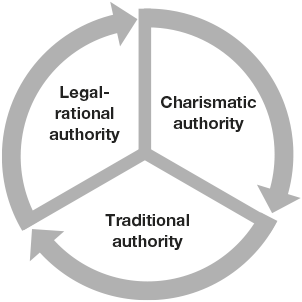WEBER’S TRIPARTITE CLASSIFICATION OF AUTHORITY
Use to identify the different forms of authority that are available to you as a manager.
Max Weber identified three sources of authority or power. These were charismatic, traditional and legal-rational.

- Charismatic authority is defined by Weber as an ‘extraordinary and personal gift of grace’ (charisma) given only to a few. Staff are drawn to charismatic managers and believe that they are highly capable, have special abilities and can be trusted to deliver on their promises.
- Traditional authority or power is based on inheritance. It can be held by individuals, families, elites and groups and is passed from one generation to the next. For example, the power and status inherent in royal families is passed on through the line of succession.
- Legal-rational authority is the power that comes with a particular office. The office holder can exercise all the powers of that office until such time as they leave the post. For example, the Sales Director has the rational authority to direct all sales staff for as long as s/he holds that post.
The classic example of these three types of authority is taken from the Catholic Church. Christ, the head of the church, is charismatic. Catholic priests on ordination acquire traditional power over the laity and the Pope exercises legal-rational power over the entire church.
HOW TO USE IT
- Identify the level of authority you have under each heading.
- According to Weber charismatic authority is possessed by only a few. But before you decide that you lack charisma revisit Theory 16.
- Traditional authority is based on shared allegiance. If you are an outsider working in a family-owned business your opportunities for promotion to a senior position are limited unless you are willing to marry into the family. To fulfil your ambitions you may have to leave. But before you jump ship remember that traditional authority can exist in any organisation where the elite are united by shared histories of public school, university, the military or any one of 100 other experiences.
- As a manager, you automatically have some legal-rational authority and people expect you to use it. Don’t disappoint them.
- Typically most readers of this book will have little or no traditional power, some charismatic power and, depending on your seniority, a significant amount of legal-rational power.
- Work on increasing your charismatic power (see Theory 16).
- Identify the extent of your legal-rational power and be willing to use it. Too often managers fail to use the power they have because they are embarrassed telling people what to do. You must banish such conceits. Management is hard enough without you refusing to use all the tools available to you.
QUESTIONS TO ASK
- What are the limits of my legal-rational power?
- What elements of charismatic power (honesty, integrity, loyalty) do I possess?
..................Content has been hidden....................
You can't read the all page of ebook, please click here login for view all page.
